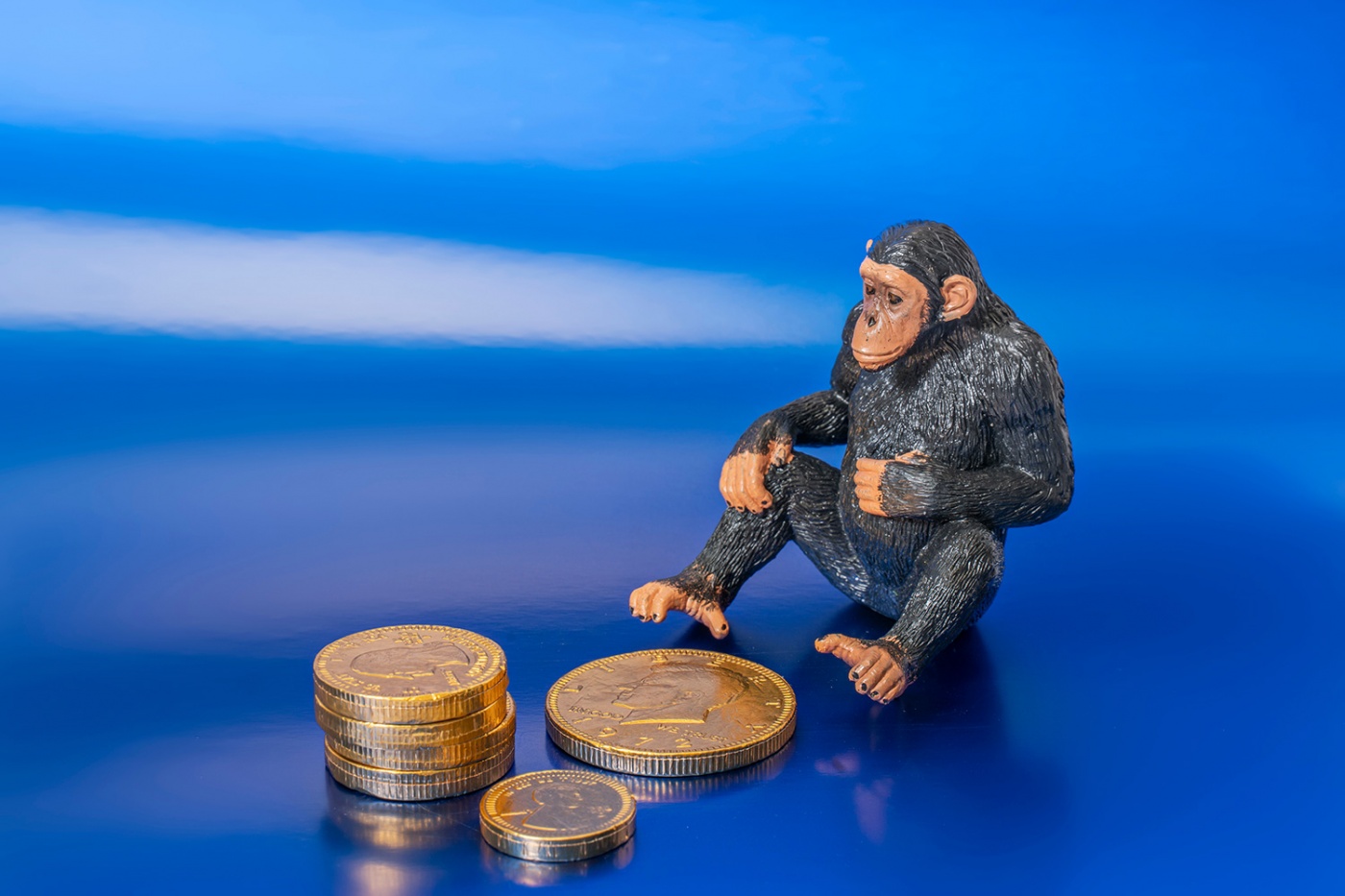Me Stupid, You Smart, Me Rich Ape in the Metaverse
Let’s cast our minds back to the end of 2020 where the winning summation for the year was “looking both ways before crossing the street and then getting hit by a submarine.” We had no idea, did we then, when we laughed about the “FOMO sapiens” when Bitcoin broke $30,000 that we would be ending 2021 on an even more dissonating, if not stark raving mad, note.
We have posts like these on forums called “What’s the point of honest, hard work?”
“Went to an ivy for undergrad/MBA, graduated with honors both times, and have been in finance for 10+ years now. After all this grinding, sleepless nights, perpetual stress, etc., I have a nest egg of about $2.5 million after paying off all my debt, except my mortgage. Just found out from my parents that a degenerate cousin of mine who is 3 years younger is worth $3-4 million NET of taxes from YOLO bets on GME, Doge, and other memes. Not just him but some of his stoner buddies too.
For context, this guy barely passed high school taking remedial classes, got kicked out of community college, and was working at Sam’s Club last time I heard. Now he bought his parents a house and matching Teslas for his entire immediate family. Ironically, he feels like he’s in a position to give me “investment advice.” I get that life isn’t fair and I’m doing my best not to be jealous, but I’m only human. Anyone else as lucky as me on here?”
“16 years of education and $120,000 for a fancy MBA only to watch another dog-themed crypto outperform every asset on earth.” — Douglas A. Booneparth
Fresh new comments this week after “a shitcoin of a memecoin is more valuable than the underlying memecoin and both coins have a larger market cap than Deutsche Bank. 2021 is wild af.” This is in reference to the new Shiba Inu coin (the shitcoin) that managed to overtake Dogecoin (the memecoin) in market cap where a single wallet, which bought roughly US$8,000 of $SHIB last August is now worth US$5.7 billion in just about 400 days—making it perhaps one of the greatest individual trades of all time.
Coins like Elonomics are up 11,968 per cent in 24 hours, CatzCoin is up 2,554 per cent at the same time, the Squid Game coin is up more than 86,000 per cent in a week, but nothing beats UpCake coin that is up some 141,072,585 per cent in 90 days. It really puts Donald Trump’s SPAC to shame for it only managed to skyrocket to 1,657 per cent at its high.
We are in a world where Elon Musk has garnered more wealth in the last nine months than Warren Buffet in 91 years when the Tesla stock gained a record-breaking US$310 billion in market cap in just two weeks—more than the entire market cap of 482 of the 500 companies in the S&P 500.
An unrelated stock Meta Materials stock soared 32 per cent after Facebook renamed itself Meta.
“There comes a point in every confidence cycle when the hoax goes too far—when the crowd squirms uncomfortably at the outright ridiculousness of the pitch.” — Peter Atwater
2021 has stupefied everyone in regular finance and most folks, including regulators, rather look away and brush it off as a joke or hope it will all go away like a bad dream. But it is not going away anytime soon and we better re-examine our stance as we are starting to feel like the stupid ones this year for missing out in the race to make money from some of the seemingly stupidest trades.
“Some younger people have made so much money in cryptocurrencies, non-fungible tokens (NFTs) and meme stocks that they can sit at home rather than enter the workforce. More power to them.” — David Einhorn
It all started with Hertz last year when the Reddit crowd found they could profit obscenely from buying heavily shorted bankrupted companies, affectionately (or self-deprecatingly) calling themselves retards/autists/degenerates/apes, celebrating their ignorance or lack of financial savvy as a taunt to the Wall Street “suits.”
And that movement has gained momentum to become a rebellion against the establishment. Millions are answering the call to arms, driven by both ideology and greed. Befittingly, Elon Musk has become the icon of millions who will blindly take to his calls on Twitter, and crowned the Meme-Stock lord by Bloomberg this week.
It is frustrating, to say the least especially for investment gurus from old school finance who keep getting proven wrong this entire year and tempers are starting to fray.
“A new investor demographic has emerged. These individuals are younger, inexperienced and most underestimate or fail to respect risk. The “Diamond Hands” mentality in a persistent bull market is setting up an entire generation for the biggest personal financial losses in decades.” — Mark Minervini
We also fail to see how the forever rally is sustainable in the face of higher interest rates, but let us grab the bull by its horns and examine the facts. Is this a new world or a disaster in the making?
2021 has rewarded idiosyncrasy and the Apes or any illogical Neanderthal trading strategy, if it can be considered even a trading strategy as opposed to gambling. Yet several hedge funds have been humbled and brought to an existential crisis in a “Me Stupid, You Smart, Me Rich Ape” scenario.
For example, millions of South Koreans have jumped into stock market trading over the past year with their enthusiasm feeding off a new market force; popular investment channels on YouTube.
For the illusion of smart and stupid investors, as Stern professor Damodaran alludes (and also alludes that his textbooks don’t work), day traders are not going away anytime soon.
It is just too accessible now and the adoption rate is faster than ever as video games turn pandemic jobless into crypto traders and Reddit meme-stock traders even as China recognises and clamps down but Robinhood and Coinbase are not going away anytime soon.
The affirmation by markets as main street gets on board with crypto and Bitcoin ETFs are legitimately listed by the day as even Indian celebrities jump onto the NFT bandwagon.
Meme-fication is not going away and has become mainstream; we recognise that Elon Musk has the single-handed power to move markets just as Jack Dorsey is able to get away with his fallacious tweet about hyperinflation without recrimination as other Twitter and Reddit users are fleeced in pump and dump schemes.
Meme-fication has given narrative finance and markets a new life. 86 per cent of American kids and U.K. kids, for that matter, rather aspire to be social media influencers instead of astronauts as the majority of Chinese kids aspire to be.

This suggests that the meme-fication phenomenon will stay for a while as a generation of non-thinkers apply inductive reasoning to investment as opposed to deductive reasoning.
Social media narratives drive the markets and finance more than fundamentals.
2021 in summary: “When you hear hoofbeats behind you, expect to see a zebra!”
Illogic is fast getting assimilated into our reality. For the love of all things insane, this week we discovered a new tungsten fad, where the joke about a nonexistent tungsten shortage has led to Amazon running out of tungsten cubes which crypto investors use for contemplation, for the love of tungsten, and folks out there are bidding to touch a 1,784-pound tungsten cube once a year. Not far behind is the NFT of a Cryptopunk, which sold for US$532 million (it was not a real sale), as exposed on Bloomberg, but a mere round-tripping of an NFT bought and sold by the same account just to register the US$532 million value, which would have been downright illegal in the equity space.
Thus, we are not worried about Zuckerberg’s Metaverse because it will be bound to take off once it is perceived to be anti-establishment (or if Elon Musk tweets about it).
We may be rendered slightly speechless now, but we are no longer in disdain or doubt. Everything that is happening in markets is as real as can be. It is about time we stopped denying and go along with the narrative and start reading up a bit more about this generational paradigm shift in investing.
PS: We went and ordered a couple of tungsten cubes to be delivered, by the way, for contemplation.


